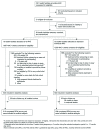Group versus individual antenatal and first year postpartum care: Study protocol for a multi-country cluster randomized controlled trial in Kenya and Nigeria
- PMID: 30706056
- PMCID: PMC6350506
- DOI: 10.12688/gatesopenres.12867.2
Group versus individual antenatal and first year postpartum care: Study protocol for a multi-country cluster randomized controlled trial in Kenya and Nigeria
Abstract
Background: Antenatal care (ANC) in many low- and middle-income countries is under-utilized and of sub-optimal quality. Group ANC (G-ANC) is an intervention designed to improve the experience and provision of ANC for groups of women (cohorts) at similar stages of pregnancy. Methods: A two-arm, two-phase, cluster randomized controlled trial (cRCT) (non-blinded) is being conducted in Kenya and Nigeria. Public health facilities were matched and randomized to either standard individual ANC (control) or G-ANC (intervention) prior to enrollment. Participants include pregnant women attending first ANC at gestational age <24 weeks, health care providers, and sub-national health managers. Enrollment ended in June 2017 for both countries. In the intervention arm, pregnant women are assigned to cohorts at first ANC visit and receive subsequent care together during five meetings facilitated by a health care provider (Phase 1). After birth, the same cohorts meet four times over 12 months with their babies (Phase 2). Data collection was performed through surveys, clinical data extraction, focus group discussions, and in-depth interviews. Phase 1 data collection ended in January 2018 and Phase 2 concludes in November 2018. Intention-to-treat analysis will be used to evaluate primary outcomes for Phases 1 and 2: health facility delivery and use of a modern method of family planning at 12 months postpartum, respectively. Data analysis and reporting of results will be consistent with norms for cRCTs. General estimating equation models that account for clustering will be employed for primary outcome analyzes. Results: Overall 1,075 and 1,013 pregnant women were enrolled in Nigeria and Kenya, respectively. Final study results will be available in February 2019. Conclusions: This is the first cRCT on G-ANC in Africa. It is among the first to examine the effects of continuing group care through the first year postpartum. Registration: Pan African Clinical Trials Registry PACTR201706002254227 May 02, 2017.
Keywords: Group antenatal care; Kenya; Nigeria; experience of care; facility-based delivery; health literacy; postpartum family planning; self-efficacy.
Conflict of interest statement
No competing interests were disclosed.
Figures



References
-
- deMasi S, Bucagu M, Tunçalp Ӧ, et al. : Integrated Person-Centered Health Care for All Women During Pregnancy: Implementing World Health Organization Recommendations on Antenatal Care for a Positive Pregnancy Experience. Glob Health Sci Pract. 2017;5(2):197–201. 10.9745/GHSP-D-17-00141 - DOI - PMC - PubMed
-
- World Health Organization: WHO Recommendations on Antenatal Care for a Positive Pregnancy Experience. Geneva: World Health Organization;2016. - PubMed
-
- Obago IT: The Role of Antenatal Care in Predicting Health Facility Delivery among Women in Kenya: Further Analysis of Data from the 2008-09 KDHS. Report No.: 86. Calverton, MD USA:ICF Internations;2013. Reference Source
LinkOut - more resources
Full Text Sources

